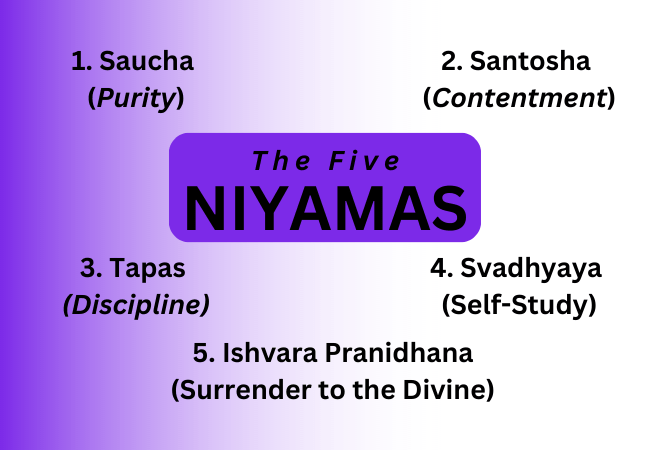Patanjali’s eight-limbed yoga system encompasses various aspects of a yogi’s journey towards self-realization and inner growth. Among these limbs, the second limb, Niyama, holds great significance. Niyama consists of five internal practices that extend beyond external conduct and focus on nurturing a positive internal environment for the yogi’s body, mind, and spirit. By embracing Niyama, practitioners cultivate self-discipline, humility, and inner strength, essential qualities for progressing on the path of yoga. In this article, we will explore the transformative power of Niyama and its role in creating a harmonious and thriving inner landscape.
1. Saucha (Purity):
Saucha, the first principle of Niyama, revolves around the concept of purity. It involves purifying the body, mind, and environment to create a conducive space for growth and self-discovery. On a physical level, saucha encompasses practices such as cleanliness, proper hygiene, and maintaining a healthy lifestyle. Internally, it involves purifying our thoughts, emotions, and intentions. By embracing saucha, individuals can let go of clutter, both external and internal, leading to a heightened sense of clarity and focus.
2. Santosha (Contentment):
Santosha, the second principle of Niyama, emphasizes the cultivation of contentment and gratitude. It encourages individuals to find fulfillment in the present moment, rather than constantly seeking external validation or material possessions. Santosha teaches us to appreciate what we have and to let go of desires that stem from a place of lack. By practicing contentment, we can attain a deep sense of peace and harmony, irrespective of our circumstances.
3. Tapas (Discipline):
Tapas, the third principle of Niyama, embodies the essence of self-discipline and perseverance. It involves cultivating inner fire and harnessing our willpower to overcome challenges and achieve our goals. Tapas encourages individuals to embrace discomfort and engage in practices that promote personal growth. This could involve committing to a regular yoga or meditation practice, adopting a healthier lifestyle, or pursuing personal and professional endeavors with dedication and determination. Through tapas, individuals can unlock their true potential and experience profound transformation.
4. Svadhyaya (Self-Study):
Svadhyaya, the fourth principle of Niyama, encompasses the practice of self-reflection and self-study. It involves observing our thoughts, emotions, and actions with a sense of curiosity and non-judgment. Svadhyaya encourages individuals to explore their inner landscapes, uncover limiting beliefs, and gain a deeper understanding of themselves. It can be achieved through practices such as journaling, reading spiritual texts, seeking knowledge from wise teachers, and engaging in introspective activities. By embracing svadhyaya, individuals embark on a journey of self-discovery and self-transformation.
5. Ishvara Pranidhana (Surrender to the Divine):
Ishvara Pranidhana, the fifth principle of Niyama, revolves around surrendering to a higher power or divine energy. It encourages individuals to let go of their ego-driven desires and trust in the natural flow of life. Ishvara Pranidhana invites individuals to cultivate a sense of humility, acceptance, and surrender to the greater wisdom of the universe. It can be practiced through prayer, meditation, or simply by acknowledging the interconnectedness of all beings. By embracing Ishvara Pranidhana, individuals find solace in the knowledge that they are a part of something greater and that they can surrender to the divine intelligence guiding their journey.
Niyama, the personal observances of yoga, offers a profound path towards self-discipline, self-awareness, and inner harmony. By incorporating the principles of saucha, santosha, tapas, svadhyaya, and Ishvara Pranidhana into our lives, we can cultivate a deeper connection with ourselves, others, and the world around us. Niyama serves as a guide, reminding us to nurture our physical, mental, and spiritual well-being. As we embark on this journey of self-discovery and self-transformation, may we find solace, joy, and fulfillment in the practice of Niyama.











































